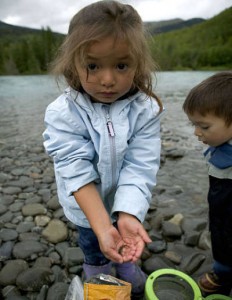Have you seen the commercial where the mom is reading Curious George (off a screen, natch) to her curious young daughter? Then the curious little girl interrupts to ask the screen (Google’s version of Siri) “How many miles from the earth to the moon?” — and of course the screen delivers the dry mileage fact in a voice similarly soulless to Siri’s. Again I feel the need to shout from the rooftops that we thwart rather than foster our young child’s intelligence when we overlook the connection between wonder and brainpower.
The wild thing is, when I went online to look up the actual commercial (despite the impression it made on me, I didn’t know what it was for!), I really loved the actual full-length version, which never plays on T.V.! In the full-length version we see Curious Little Girl enjoying enchanted, imaginative playtime, building her brain big-time. It bugs me that the short version is what millions of people were seeing daily, because, sadly, what runs on T.V. becomes somehow instructive: Oh, what a cool thing for my 5-year-old to be able to do — ask for any fact at any time!
The season of choosing what gifts to give children (shall it be screens, or silk scarves…push-button or child-powered?) inspires me to run a new version of a post I wrote over the summer, around the time of the Venus transit. To write about the importance of wonder. When you choose a gift for a young child this year (meaning, up to around age seven), ask yourself, Does this foster or thwart the child’s sense of wonder?
Wonder and Brainpower Go Together
A fundamental need of the young child until around seven is an atmosphere in harmony with his natural impulse to celebrate beauty and feel reverence and awe about almost everything. But what does our culture do in this techno-materialist age? We foist upon even the youngest child a flat world of facts and commentary. At a time when the child most needs wonder and reverence, we explain away all sense of the miraculous  with our cool adult intellect, with the good intention of helping prepare them for the real world. (“Daddy, look at that bright star!” “Oh yes, Esmerelda — do you know that a star is just a very dense concentration of gases — just air! — that burns very, very hot…thousands of light-years away…”) Mystery eradicated, poof!
with our cool adult intellect, with the good intention of helping prepare them for the real world. (“Daddy, look at that bright star!” “Oh yes, Esmerelda — do you know that a star is just a very dense concentration of gases — just air! — that burns very, very hot…thousands of light-years away…”) Mystery eradicated, poof!
Sheltering your child’s natural sense of wonder — and indeed, cultivating your own if it has atrophied over the years — is a gift of lasting wellbeing for you both. An inoculation against ennui. That sense of “Wow, water out of the tap! or “Wow, text sent over phone lines through squeaky little noises!” is a route to vast inner horizons. When we lose that, we need ever more stimulation — more shopping, more drama, more drugs and alcohol, more thrillers (which feeds the collective propensity toward societal violence), more sexual excess, and so on — to fill the void of disenchantment.
 One helpful way to cultivate wonder is to imagine looking out at the world through your child’s eyes, which brings the uplifting quality of his or her natural enchantment to the fore. The more we can live, as Joseph Chilton Pearce puts it, “in constant astonishment,” the more we can attune to the aspect of our children that seeks reverence, awe and beauty. Having a child by your side — looking out through her eyes of wonder — gives you permission to be especially exuberant in expressing delight in a world in which everything can be magically alive. “Hello, leaves…hello, pebbles…hello, wind!” A central tenet of esoteric psychology is that once you acknowledge the life in everything, it awakens life energies in you. Perhaps this is one reason behind the success of mindfulness for treating depression.
One helpful way to cultivate wonder is to imagine looking out at the world through your child’s eyes, which brings the uplifting quality of his or her natural enchantment to the fore. The more we can live, as Joseph Chilton Pearce puts it, “in constant astonishment,” the more we can attune to the aspect of our children that seeks reverence, awe and beauty. Having a child by your side — looking out through her eyes of wonder — gives you permission to be especially exuberant in expressing delight in a world in which everything can be magically alive. “Hello, leaves…hello, pebbles…hello, wind!” A central tenet of esoteric psychology is that once you acknowledge the life in everything, it awakens life energies in you. Perhaps this is one reason behind the success of mindfulness for treating depression.
Avoiding TTD (Talk it To Death) Syndrome
One of the simplest ways to increase a sense of reverence and awe is to put yourself on a zip-the-lip regime. Say less, let it mean more. There is an epidemic raging, which I call TTD (Talk it To Death) syndrome. One only has to spend a little time with any American family to see TTD in action: “Why is there a rainbow on the wall?” “Well, Samantha, the sunlight is being split into seven different wavelengths by the refractive index of the crystal on my watch sitting there on the counter.” Wonder and awe quotient abysmally low.
 The Hurried Child author David Elkind offers an illustration of how young children’s questions are usually focused on the purpose (why) of things rather than an explanation (how): His preschool aged son asked him, “Daddy, why does the sun shine?” At first tempted to give him a scientific answer about the relationship of heat and light, he remembered this principle behind the young child’s questions. He simply answered, “To keep us warm, and to make the grass and the flowers grow.” In this spirit, a more nurturing response to Samantha’s question about the rainbow might have been, “To make our morning more beautiful with the special qualities that sunlight can have.”
The Hurried Child author David Elkind offers an illustration of how young children’s questions are usually focused on the purpose (why) of things rather than an explanation (how): His preschool aged son asked him, “Daddy, why does the sun shine?” At first tempted to give him a scientific answer about the relationship of heat and light, he remembered this principle behind the young child’s questions. He simply answered, “To keep us warm, and to make the grass and the flowers grow.” In this spirit, a more nurturing response to Samantha’s question about the rainbow might have been, “To make our morning more beautiful with the special qualities that sunlight can have.”
Your young child (especially at four and five) will generate a seemingly unending stream of questions — one of the ways she is working on developing intellectual and social initiative. There is a delicate balance for the attuned parent to strike — between falling into the TTD trap on the one hand, or being dismissive or unresponsive to the child’s earnest inquiries on the other. If we brush off, demean or ignore a child’s questions he may associate curiosity with a feeling of guilt or shame, which is a catastrophe for the future peacemaker, in whom curiosity must remain a crackling blaze.
To support and foster his robust sense of initiative and curiosity, strive to feel your way into the lifeworld of the young child, which wants to know in a way that preserves wonder and reverence for a still-magical world. There is time aplenty for the bottom-line, scientific knowledge of “reality.”
Two Wonder-Full Responses to a Child’s Endless Stream of Questions
 Here are two handy answers to have at the ready, which work in virtually any situation in which you’re caught off-guard by your child’s question (like when our son asked, “Do people grow down before they die?”). The first is, “I wonder…” This leaves the child’s own imagination open to all the possibilities that will come her way, and allows her to remain in the dream-space that is a child’s right. I fear, however, that in our hyperintellectual culture many parents would feel remiss in giving a response like this, afraid of failing the child by not providing an “answer.” Yes, “I wonder” can be considered an advanced maneuver that you can work toward saying with confidence and tranquility.
Here are two handy answers to have at the ready, which work in virtually any situation in which you’re caught off-guard by your child’s question (like when our son asked, “Do people grow down before they die?”). The first is, “I wonder…” This leaves the child’s own imagination open to all the possibilities that will come her way, and allows her to remain in the dream-space that is a child’s right. I fear, however, that in our hyperintellectual culture many parents would feel remiss in giving a response like this, afraid of failing the child by not providing an “answer.” Yes, “I wonder” can be considered an advanced maneuver that you can work toward saying with confidence and tranquility.
The second is Elkind’s suggestion to ask the question back to the child. “Well, why do you think a rainbow has appeared in our kitchen?” This will often elicit a stream of enchanting insights into your child’s imaginative capacities — all of which should be met with the utmost interest and respect for her opinions on the matter, never “corrected.” Remember, there will be time aplenty for “reality.”
When Siri or Google Nexus can answer Curious Little Girl’s question with, “Well, how far do you think it might be from the earth to the sun?” then they’ll have something.
But Everyone’s Kids Have One!
 We worry about peer pressure on our kids, but we best be mindful not to cave to peer pressure on ourselves! I got a wonderfully vivid lesson in this last summer while watching Venus transit the sun. With those oh-so-stylish eclipse glasses on I couldn’t see anything going on around me, including my friends giggling and taking photos of me enraptured by the heavenly bodies above. I could see only what I was focused on: the glowing sun with little Venus snaking her way across.
We worry about peer pressure on our kids, but we best be mindful not to cave to peer pressure on ourselves! I got a wonderfully vivid lesson in this last summer while watching Venus transit the sun. With those oh-so-stylish eclipse glasses on I couldn’t see anything going on around me, including my friends giggling and taking photos of me enraptured by the heavenly bodies above. I could see only what I was focused on: the glowing sun with little Venus snaking her way across.
Great analogy for filtering out whatever is extraneous, distracting or unhelpful to us in focusing on any central objective, including parenting on the leading edge. Imagine having those eclipse glasses on to filter out unsupportive family, skeptical friends, judgmental looks in public, and even your own doubts or hesitations as you parent on the path less traveled.
See instead the shining vision of your child unfolding qualities essential in an innovative peacemaker poised for success in a changing world — curiosity, playfulness, willingness to experiment, flexibility, humor, receptiveness to new ideas, eagerness to learn. These lifelong qualities (plus at least five more) are nurtured by wonder now.

*******
By Marcy Axness, PhD, author of Parenting for Peace: Raising the Next Generation of Peacemakers
Images
by Jeremiah Lawrence on Unsplash
by Laura Nyhuis on Unsplash
by Liz Bolden
by Anna Delliou on Unsplash
Tags: holiday gifts, Siri, technology, toys, wonder


